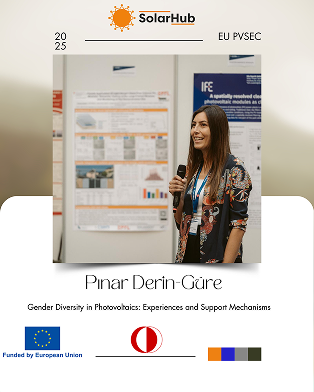

SolarHub Partner Receives Best Poster Award at EU PVSEC 2025 for Work on Gender Diversity in Photovoltaics
TBrussels, Belgium - Another remarkable milestone has been achieved by the SolarHub consortium. Assoc. Prof. Pınar Derin Güre, faculty member at Middle East Technical University (METU, has been awarded the Best Poster Award at the European Photovoltaic Solar Energy Conference and Exhibition (EU PVSEC) 2025 for her collaborative work titled: “Gender Diversity in Photovoltaics: Experiences and Support Mechanisms.” This recognition is especially meaningful as the awarded poster highlights gender-related challenges and support mechanisms in the photovoltaic (PV) sector a topic often underrepresented in the clean energy transition discourse. The work is rooted in interdisciplinary research and reflects contributions from across the European solar energy research community. It also acknowledges SolarHub funding, and notably features Dr. Hande Eryılmaz, PhD, SolarHub Project Manager from ODTÜ-GÜNAM, as a co-author. Other co-authors include leading figures from institutions such as Fraunhofer ISE, the European Energy Research Alliance (EERA PV), and experts involved in ETIP PV’s Social and Reliable PV Working Group and EERA PV SP8 on Socioeconomic Aspects of PV. This award from EU PVSEC one of the world’s leading platforms for photovoltaic research, technologies and applications not only honours a high-quality scientific contribution, but also elevates the broader mission of SolarHub: to foster a just, inclusive, and innovation-driven solar energy ecosystem in Türkiye and across Europe. We extend our sincere congratulations to Assoc. Prof. Pınar Derin Güre, Dr. Hande Eryılmaz, and all co-authors for this outstanding recognition. Their efforts continue to strengthen the scientific, social, and strategic foundations of SolarHub. See the Poster
The Future of Energy–Water–Food Systems
This report, prepared by Odysseas Spyroglou, reflects on the outcomes of a joint foresight workshop that brought together Excellence Hubs to imagine the future of energy, water, and food systems by 2050. It shows clearly that these three domains cannot be treated in isolation: renewable energy transitions require stable water systems, food security depends on both, and all are shaped by climate disruption, shifting geopolitics, and societal change. The analysis identifies critical infrastructures such as renewable grids, sustainable agriculture, water recycling, digital monitoring, and circular economy platforms as essential foundations for resilience. Yet it also cautions that technology on its own is not enough. Without inclusive governance and fair access, even the most advanced innovations risk deepening divides instead of strengthening societies. Spyroglou’s work reminds us that resilience in 2050 will not be measured solely by the breakthroughs we achieve, but by whether these systems are governed in a way that extends dignity and security to all.
To read with more visuals and explanations, see also online: https://solarwaterfood.my.canva.site/
Click here to download Future of Energy Water Food Systems Report
Community Agrivoltaics:
A new application of social and climate justice

The recent demonstrations of farmers, from Poland and France to Greece, bring back to the public debate the urgent need to (re)develop our agricultural policy. From the European Common Agricultural Policy (CAP), and the imbalanced farmer-agro-industry power relations in supply chains, the issue is multifaceted. Let us focus on one aspect of it: access to cheap – and clean – energy. The dependence of agricultural production on fossil fuels (see motorization, equipment, irrigation) puts a significant burden on the budget of the farmers themselves, and also leads to revaluations (see the ‘fossilflation’ phenomenon) in the supply chain – with consumers as the ultimate ‘victims’.
Subsidies for solar projects by farmers, a policy with years of implementation in Greece and Europe, can provide an additional income stream, while at the same time significantly alleviating a farmer’s operating costs. Supporting farmers to engage in RES projects (e.g., photovoltaics or biomass) is therefore a clear win-win solution for society and the climate. But could we move the equation one step further? Read more..

